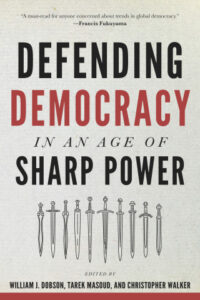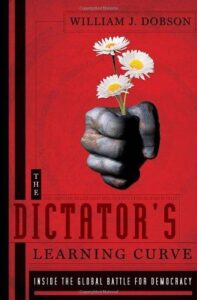 Admiration for autocracy draws on the “myth of benevolent dictatorship” which is built on three flimsy pillars, notes Brian Klaas, an associate professor of global politics at University College London: first, that dictators produce stronger economic growth than their democratic counterparts; second, that dictators, unswayed by volatile public opinion, are strategic long-term thinkers; and third, that dictators bring stability, whereas divided democracies produce chaos, he writes for The Atlantic:
Admiration for autocracy draws on the “myth of benevolent dictatorship” which is built on three flimsy pillars, notes Brian Klaas, an associate professor of global politics at University College London: first, that dictators produce stronger economic growth than their democratic counterparts; second, that dictators, unswayed by volatile public opinion, are strategic long-term thinkers; and third, that dictators bring stability, whereas divided democracies produce chaos, he writes for The Atlantic:
- [M]ost rigorous studies have found limited or no evidence that authoritarian regimes produce better economic growth than democratic ones. Some researchers, such as the political economists Darren Acemoglu and James Robinson, have found compelling evidence that the inclusive political institutions of democracy are one of the strongest factors in producing stable, long-term growth…..Even China, the apparent authoritarian economic miracle, is showing signs of slowing down, its growth model no longer so well matched to the global economy. Such cracks in growth are an innate feature of autocracy.
- The longer despots cling to power, the more likely they are to fall into what I call “the dictator trap,” in which they crush dissent, purge anyone who challenges them, and construct their own reality through propaganda, all to maintain control…. The often-disastrous demise of autocrats creates a negative feedback loop. Nearly seven in 10 leaders of personalist dictatorships end up jailed, exiled, or killed once they lose power. While in power, many despots are aware of this grim fact, and so they use violence to stay in power, often growing more extreme as they lurch toward their downfall. The effect can hardly be called “stability,” even if the same person occupies the palace for decades.
 Autocrats appear stable, but they’re not. They’re constantly vulnerable, forced to make every decision based on what will stave off threats to survive in power. ….The stability that does exist in autocracies is, ironically, derived partially from the trappings of democracy. Recent research has made clear that dictators have developed mechanisms to “mimic democracy to prolong autocracy.” Most authoritarian leaders now hold elections, but rig them. Some use parliaments or courts to enact unpopular decisions while avoiding blame.
Autocrats appear stable, but they’re not. They’re constantly vulnerable, forced to make every decision based on what will stave off threats to survive in power. ….The stability that does exist in autocracies is, ironically, derived partially from the trappings of democracy. Recent research has made clear that dictators have developed mechanisms to “mimic democracy to prolong autocracy.” Most authoritarian leaders now hold elections, but rig them. Some use parliaments or courts to enact unpopular decisions while avoiding blame.
Dictators are waging a hidden war on democracy, according to a new book.
Although Russia and China are perhaps the most adept at wielding sharp power, the world’s dictators are fast learning their dark arts, note analysts William J. Dobson and Tarek Masoud. Dictators are no longer content to shore up their own rule, they are now reaching across borders to prevent democracy where it does not yet exist, and to undermine it where it does.
Autocracies such as Iran, Saudi Arabia, and the United Arab Emirates routinely weaponize social media and are increasingly penetrating Western cultural and academic institutions in an effort to legitimize their regimes, drown out critics, and distort narratives. They display little hesitation in using their sharp-power tools to snip any green shoots of democracy that appear in their immediate environs, they observe in Defending Democracy in an Age of Sharp Power, co-edited with Christopher Walker from the National Endowment for Democracy’s International Forum.







